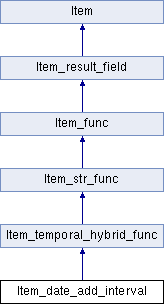|
My Project
|
|
My Project
|

Public Member Functions | |
| Item_date_add_interval (Item *a, Item *b, interval_type type_arg, bool neg_arg) | |
| const char * | func_name () const |
| void | fix_length_and_dec () |
| bool | eq (const Item *item, bool binary_cmp) const |
| void | print (String *str, enum_query_type query_type) |
Public Attributes | |
| const interval_type | int_type |
| const bool | date_sub_interval |
Protected Member Functions | |
| bool | val_datetime (MYSQL_TIME *ltime, uint fuzzy_date) |
| bool Item_date_add_interval::eq | ( | const Item * | item, |
| bool | binary_cmp | ||
| ) | const [virtual] |
This function is called when:
Reimplemented from Item_func.
| void Item_date_add_interval::print | ( | String * | str, |
| enum_query_type | query_type | ||
| ) | [virtual] |
This method is used for to:
For more information about view definition query, INFORMATION_SCHEMA query and why they should be generated from the Item-tree,
Reimplemented from Item_func.
| bool Item_date_add_interval::val_datetime | ( | MYSQL_TIME * | ltime, |
| uint | fuzzy_date | ||
| ) | [protected, virtual] |
Get "native" temporal value as MYSQL_TIME
| OUT | ltime The value is stored here. |
| IN | fuzzy_date Date flags. |
| false | On success. |
| true | On error. |
Implements Item_temporal_hybrid_func.
 1.7.6.1
1.7.6.1